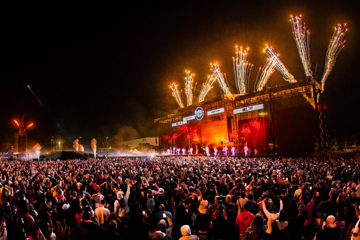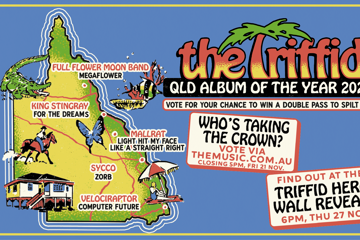Strategies Against Architecture
“Looking at such an extensive back catalogue, and we are able play about 90 per cent of that, we can make our choices wisely."

Rule number one: don't call them industrial (even if the word does appear on their website).
Despite their now mythic status as one of the true progenitors of the sound that now finds its expression in everything from the Teutonic stomp of Rammstein to the robo-pop of bands like Depeche Mode, Blixa Bargeld is adamant that the band he co-founded on April Fool's Day 1980 is not, and were never, industrial or revolutionary. Einsturzende Neubauten fans, beware!
“I'm sorry, but that's your interpretation. I never called it industrial. We never tried to be destructive,” Bargeld intones from his apartment in Berlin. “It was just things that happened, like when children play and things go kaput; and I certainly never made any statements about old buildings being better than new buildings.”
That a non-industrial (but clearly experimental) German band should be inextricably linked to architecture is right there in the name. Einsturzende Neubauten is most oft translated as 'collapsing new buildings'; with their moniker making specific reference to what Germans call neubauten, the new buildings that sprang up after 1945 to replace those destroyed during WW2. Typically, the neubauten are considered inferior both aesthetically and structurally to their pre-war counterparts, the altbauten.
Don't miss a beat with our FREE daily newsletter
Reflecting on this, Bargeld recalls the Cold War divide that once cut his country in two. “After the war, in the west at least, you could make a fortune if you had a building company; but in the east they repaired as much as they could. You could still see the bullet marks from the second world war.”
As a native of West Berlin, Blixa Bargeld, (born Hans Christian Emmerich in 1959), grew up in a walled city steeped in the pre-apocalyptic atmosphere of the Cold War. “Historically, looking at it, I probably was at one of the epicentres of the Cold War but it played absolutely no role in my day-to-day existence,” he reveals. “To me, living in Berlin felt so absolutely normal that I never thought it was exceptional.”
However, it was in this small 'capitalist' enclave that EN formed; and the band's early work shaped itself around the use of improvised instrumentation, often made from scraps scavenged from building sites, and Bargeld's deep, shouted, blood curdling vocals. Albums like 1981's Kollaps and 1983's Zeichnungen Des Patienten O.T. not only gained them a burgeoning fan base but attracted the attention of Nick Cave, who famously described Bargeld's vocals as being something “you would expect to hear from strangled cats or dying children”.
Indeed, Bargeld was with Cave (as one of the Bad Seeds) in November 1989 when Berlin, Germany and the geo-political map world lurched into a new era. “When the actual wall fell, when they opened the border, I was right there in the recording studio with a famous Australian singer mixing one of the pieces that later came out on the record and suddenly the street, which was usually empty, was full of people,” he recalls. “We first saw it on television and then we looked out the window.”
By that stage, Bargeld was enjoying the fruits of success as a member of Nick Cave & The Bad Seeds and the fall of the wall coincided with personal and artistic change. “Very soon after that I left Berlin. I lived in San Francisco and then for seven years in Beijing… Now I'm back in Berlin; but the city where I was born and grew up simply doesn't exist anymore,” he observes. “In fact, where I'm living now is uncharted territory for me. I don't know my way around. It's like a completely new city.”
For EN the changes were audible, as their earlier avant-garde edge morphed into more traditional song forms, with Bargeld singing rather than shouting and softer electronic sounds making their way onto records like Tabula Rasa and Ende Neu. Reflecting on this, Bargeld insists that EN never truly had a mission statement. “A lot of things were not so much artistic decisions as they were decisions that came out of a particular life situation,” he explains. “It was not that I thought, 'Oh, now it's time to bang on some metal' it was more the fact that we didn't have anything. We could not afford instruments. We've always been poor so we had to find a different way.”
As the 20th century drew to a close the band found itself being referenced by all and sundry in scenes as diverse as dark wave techno and nu-punk. With songs like Blume and Stella Maris, and their infamous expulsion from U2's Zoo TV tour, Einsturzende Neubauten became a name to drop; not that they were ever what you could call famous.
Far from settling with their modicum of cachet, the band leapt feet first into the age of the internet in 2002 when Bargeld and his wife Erin Zhu created neubauten.org and moved the focus of their activity online. “We invented crowd funding,” Bargeld declares proudly, pointing to a range of albums, DVDs and even USB sticks aimed at the band's pro-active web following. “Now I read many interviews lately with Amanda Palmer who said she made her album from crowd funding but what most people don't know is that she was one of the supporters of neubaten.org and she crowd funded our albums.”
If all this has helped to sustain EN into their fourth decade, it is their reputation as an unusually ferocious live act that really gets fans buzzing and quite possibly spurred The Drones to invite them to Australia to play at ATP's boutique, curated I'll Be Your Mirror event in February, where they will feature alongside fellow 'noise' legends My Bloody Valentine and Godspeed You! Black Emperor.
For Blixa Bargeld and the rest of Einsturzende Neubauten, the antipodean invitation represents the end of a significant hiatus. “The first time we'll come together is when we're in Australia,” he confirms.
Creatively, what this represents is the opportunity to look back over a 32-year career and once again reinvent. “The songs will all come out new again,” Bargeld says simply. “Looking at such an extensive back catalogue, and we are able play about 90 per cent of that, we can make our choices wisely; but obviously we are limited by what we are able to take to Australia. Weight limitations,” he notes wryly, referring to EN's onstage battery of improvised instruments.
On a personal note, it will be Bargeld's first trip to our shores since he left The Bad Seeds in 2003. “At the time that I was still playing with Nick I was in Australia every year but I haven't been there since. Has Australia changed in ten years?” he wonders aloud.
Just as the Berlin of his childhood has irrevocably altered, so too has the Melbourne with which Bargeld was once so familiar. “I spent a considerable amount of time in St Kilda. My first couple of times in Australia I spent there. That was in the early-'80s. Then, when I was there in the late '90s I thought that St Kilda had changed quite a lot. Gentrification, that's what it looked like to me,” he concludes, laughing at the suggestion that even in St Kilda the neubauten are everywhere.
Einsturzende Neubauten will be playing the following dates:
Tuesday 19 February - Palace Theatre, Melbourne VIC
Friday 22 February - Enmore Theatre, Sydney NSW
Saturday 23 February - The Tivoli, Brisbane QLD







